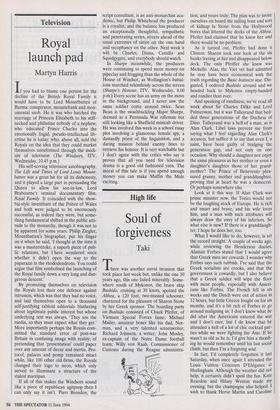Television
Royal launch pad
Martyn Harris
If you had to blame one person for the decline of the British Royal Family it would have to be Lord Mountbatten of Burma: conspirator, mountebank and mon- umental snob. He it was who hatched the marriage of Princess Elizabeth to his stiff- necked and philistine nobody of a nephew; who 'educated' Prince Charles into the emotionally frigid, pseudo-intellectual lib- ertine he is today; who, above all, sold the Royals on the idea that they could market themselves unreformed through the medi- um of television (The Windsors, ITV, Wednesday, 10.45 p.m.) His self-serving television autobiography, The Life and Times of Lord Louis Mount- batten was a great hit for all its dishonesty, and it played a large part in persuading the Queen to allow his son-in-law, Lord Brabourne's seminal documentary film, Royal Family. It coincided with the show- biz-style investiture of the Prince of Wales and both were judged to be enormously successful, as indeed they were, but some- thing fundamental shifted in the public atti- tude to the monarchy, though it was not to be apparent for some years. Philip Ziegler, Mountbatten's biographer, put his finger on it when he said, 'I thought at the time it was a masterstroke, a superb piece of pub- lic relations, but I have wondered since whether it didn't open the way to the paparazzi in the rhododendrons. You could argue that film symbolised the launching of the Royal family down a very long and dan- gerous descent.'
By promoting themselves on television the Royals lost their one defence against intrusion, which was that they had no voice, and laid themselves open to a thousand self-justifying tabloid editorials blathering about legitimate public interest but whose underlying text was always, 'They use the media, so they must expect what they get.' More importantly perhaps the Royals com- mitted the standard error of post-war Britain in confusing image with reality; of pretending that 'presentation' could paper over any amount of decay and inertia. Pro- tocol, palaces and pomp remained intact while, like 100 other old firms, the Royals changed their logo to neon, which only served to illuminate a structure of the stalest marzipan.
If all of this makes the Windsors sound like a piece of republican agitprop then I can only say it isn't. Piers Brendon, the script consultant, is an anti-monarchist aca- demic, but Philip Whitehead the producer is a royalist, and the balance has produced an exceptionally thoughtful, sympathetic and penetrating series, streets ahead of the usual extremes of satire on the one hand and sycophancy on the other. Next week it will be Charles, Diana, Camilla and Squidgygate, and everybody should watch.
In Sharpe meanwhile, the producers were continuing to spend more money on pipeclay and frogging than the whole of the House of Windsor, as Wellington's battal- ions marched relentlessly across the screen (Sharpe's Honour, ITV, Wednesday, 8.00 p.m.) Every scene has an army on the move in the background, and I never saw the same soldier come around twice. Sean Bean is the swashbuckling Major Sharpe, dressed as a Peninsula War rifleman but still looking like a Sheffield minicab driver. He was involved this week in a school essay plot involving a glamorous female spy, a dastardly priest of the Inquisition, and a daring mission behind enemy lines to retrieve his honour. It is very watchable but I don't agree with the critics who say it proves that all you need for television drama is a good old fashioned yarn. The moral of this tale is if you spend enough money you can make Muffin the Mule exciting.


































































 Previous page
Previous page